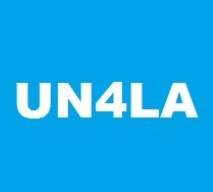UN4LA News - April 2023
A monthly newsletter published by United Neighborhoods for Los Angeles.
UN4LA's mission is to bring communities together to plan for a sustainable future. Growth must be shaped by community engagement, not developer dollars.
JURY FINDS MARK RIDLEY-THOMAS GUILTY
In late March, Mark Ridley-Thomas, one of LA's most influential political figures, was found guilty of corruption based on actions taken while he served on the LA County Board of Supervisors. The jury returned guilty verdicts on seven of the nineteen charges against the career politician, including conspiracy, bribery and honest services fraud.
Mark Ridley-Thomas Found Guilty in Corruption Case
Ridley-Thomas had been serving on the LA City Council at the time he was indicted. Because of the indictments, the Council suspended him and appointed Heather Hutt to serve as Council District 10 representative until the case was resolved. Now that Ridley-Thomas has been found guilty, Council President Paul Krekorian has expressed his desire to have Hutt to continue to represent CD 10 for the rest of the term, but some South LA leaders believe a special election should be called to let voters make the choice.
Community Leaders Want Special Election to Pick New District 10 Councilmember
EARLY RESULTS SHOW CLOSE RACE IN COUNCIL DISTRICT 6
Early results show that the race to determine who will represent LA City Council District 6 will be a close one. Imelda Padilla has taken the lead with 25.6% of the vote. Three other candidates are vying for second place: Marisa Alcaraz, with 19%; Rose Grigoryan, with 18%; and Marco Santana, with 17%. Since it appears that no candidate will gain more than 50% of the vote, the top two will compete in a runoff to determine the winner. Three other candidates are also on the ballot: Isaac Kim garnered 11% of the votes cast; Antoinette Scully, 5%; and Douglas Sierra, 3%. The special election is being held to fill the seat left vacant by former Councilmember Nury Martinez, who resigned last year after a recording emerged in which she made numerous racist remarks.
In Race to Replace LA Councilmember Nury Martinez, Padilla Leads, 3 Others Vie for Second Spot
MORE STATE HOUSING BILLS: IT'S ALL ABOUT STREAMLINING
The California legislature is in session again. No one will be surprised that they’re considering a number of bills to limit local planning power and undermine the California Environmental Quality Act. Here are a few examples:
SB-423 Land use: streamlined housing approvals: multifamily housing developments.
Adopted in 2017, SB 35 created a streamlined, ministerial approval process for qualifying infill development. In February of this year, Senator Scott Wiener introduced SB 423, which would modify and expand SB 35 provisions that allow some multi-family housing projects to take advantage of a streamlined approval process. Interestingly, this bill would allow the State Department of General Services to act in the place of a local government for the purpose of reviewing projects located on property owned by or leased to the State. SB 423 would also remove SB 35's prohibition against using the streamlined review process for projects located in a coastal zone. And most importantly, it removes the earlier bill's January 2026 sunset provision, making these provisions operative indefinitely.
Proponents of SB 423 claim that it would help create needed housing, but its critics worry that it goes too far. The League of California Cities feels that Sacramento has been burdening local jurisdictions with a barrage of housing bills that have done little to address our housing needs. The League writes that, "This measure would double-down on the recent trend of the state overriding its own mandated local housing plans by forcing cities to approve certain housing projects without regard to the needs of the community, opportunities for environmental review, or public input."
SB 423 Analysis from League of CA Cities
AB-68 Land use: streamlined housing approvals: density, subdivision, and utility approvals.
Another bill that's all about streamlining approvals for housing projects, i.e. no public hearings, no environmental review. In this case the qualifying criteria include projects that are located on a "climate-smart parcel". What does this mean? Here's the definition given by the bill:
“Climate smart parcel” means a parcel located in a highest resource, high resource, or moderate resource area, as categorized by the California Tax Credit Allocation Committee’s opportunity maps, that meets one of the following mobility indicators: (A) The parcel is located within one-half mile walking distance of either a high-quality transit corridor or a major transit stop; (B) The parcel is located in a very low vehicle travel area; (C) The parcel is located within a mile from a cluster of six or more of the following: Restaurants, Bars, Coffee shops, Supermarkets, Grocery stores, Hardware stores, Parks, Pharmacy, Drugstore.”
Clearly, the criteria are vague enough and broad enough that almost any parcel in any city in LA County could be considered a "climate smart parcel".
More streamlining, again from Scott Wiener. This bill would require local governments to streamline approval of affordable housing projects on any land owned by "an independent institution of higher education or religious institution". At least in this case there's a requirement that 100% of the units be affordable to lower income households, with an exception that would allow 20% to be set aside for moderate income households.
MAY DEADLINE SET FOR APPROVAL OF NEW ZONING CODE AND DOWNTOWN COMMUNITY PLAN
During the pandemic, time limits routinely set for planning actions were suspended, but as Covid recedes into the background, decision-makers are again facing deadlines. The last day for the LA City Council to act on approval of the Downtown Community Plan Update is May 12. This means that the last day for the Council to act on approval of the New Zoning Code is also May 12, since the Department of City Planning has tied approval of the two together. Proponents of the Downtown Plan believe that it takes necessary steps to ensure the continued growth of the area and to provide necessary housing. A number of groups have been critical of the Plan for different reasons, among them: Concerns that the Plan doesn't do enough to protect the homeless population on Skid Row; Concerns that the Plan fails to do enough to encourage the production of affordable housing; Fears that proposed zoning changes within the Fashion District could lead to the loss of thousands of jobs.
The New Zoning Code (NZC) also has supporters and opponents. By shifting the emphasis away from land use to urban form, the NZC would be a represent a fundamental change in the City's approach to planning. Those in favor believe the change is needed to promote growth, while opponents fear it will lead to a reduced emphasis on rational planning and further environmental degradation in the Downtown area.
Downtown Community Plan Update/New Zoning Code
BOYLE HEIGHTS COMMUNITY PLAN UPDATE GOES BEFORE CITY PLANNING COMMISSION
On Thursday, April 20, the LA City Planning Commission will consider making a recommendation regarding the Boyle Heights Community Plan Update. According to the Department of City Planning, “Priorities of the update include promoting new affordable housing along transit-served commercial corridors, while maintaining the existing residential neighborhoods and neighborhood identity.” It will be interesting to see whether Boyle Heights residents have faith in the Department’s claims. The area has been a battleground due to gentrification and displacement. In recent years local activists have shown that they’re determined to protect the area’s low-income residents from real estate speculators.
Boyle Heights Community Plan Update
THE CITY OF L.A. IS TAKING AN INVENTORY OF ITS TREES
The City of LA has around 700,000 street trees, and keeping them healthy is a huge job. In order to better understand the challenges involved in maintaining these trees, StreetsLA is working with Davey Resource Group to conduct an inventory. Davey’s arborists are gathering information about size, location, and species. This data will be integrated with an inventory of trees in city parks which is being performed by the Department of Recreation and Parks.
Want to see what they have so far? Click on the link below.

